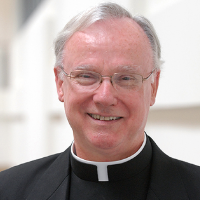
Readings:
Reading 1: Jeremiah: 23:1-6
Responsorial Psalm: Psalm 23:1-3, 3-4, 5, 6
Reading 2: Ephesians 2:13-18
Gospel: Mark 6:30-34
The famous German Protestant theologian, Karl Barth, told preachers that they should have “the Bible in one hand and the newspaper in the other.” Sometimes the biblical writers seem to have precisely that in mind, as they seem to in this Sunday’s readings. There is a lot of discussion these days — and a lot of heat — in our daily discourse about our political and religious leadership. There is the “big steal” and the “big lie”— and there has been much controversy even over a proposed statement on the Eucharist by our Catholic bishops, a topic, to say the least, that usually doesn’t make it into the ordinary news channels!
The Scripture readings for today, of course, do not comment directly on any of these controversies, but both the first reading and the gospel selection reflect on authentic leadership. A fundamental biblical image for responsible leadership is drawn from the agrarian context of times, that of “shepherd.” In the first reading the prophet Jeremiah (like his later counterpart, Ezekiel) rails against the false shepherds, that is, civic leaders who instead of gathering the people into unity “scatter” them and fail to “care for them” — instead, bringing “fear and trembling” on the people. Jeremiah foresees a prophet like the ideal king David who will “govern wisely” and “do what is just and right in the land.”
The beautiful Responsorial Psalm 23 — “The Lord is my shepherd; there is nothing I shall want” — sees God’s own compassionate love for his people as the model of the true leader, the righteous shepherd, devoted to the good of the people, and one who drives away fear.
The selection from Mark’s Gospel continues this motif, now portraying Jesus himself as the compassionate shepherd. In last Sunday’s Gospel, Jesus had sent his apostles out on a mission to care for the sick and to heal them. This Sunday’s selection picks up the thread — now the apostles return from their mission and report to Jesus all they had done. Sensing their exhaustion, Jesus invites them to come with him “to a deserted place and rest a while.” But they could not escape the yearning of the crowds to see and hear Jesus. When they come ashore at what they expected to be a quiet place, the crowds had already gathered “from all the towns,” waiting for them. At this moment, despite Jesus’s own exhaustion, Mark’s Gospel notes: “his heart was moved with pity for them, for they were like sheep without a shepherd; and he began to teach them many things.”
For several Sundays, we have been hearing in sequence selections from Ephesians. Even if by chance, today’s selection points to another prime biblical quality of authentic leadership, that of building unity. The Letter speaks of “those once far off” and those “near” — terms cited in the prophet Isaiah to describe the separation between Jews and Gentiles. Jesus’ life of compassion and his death, as the greatest expression of “friendship love,” bridge these ancient differences and effects reconciliation Jesus, the author notes, “preached peace” to both peoples that he “might reconcile both to God.” Jesus’ work of reconciliation was costly but was the ultimate purpose of his presence among us.
Anyone who has had to exercise leadership — whether in a family, an institution or in a civic role — knows how challenging it can be to reconcile differences and to build unity. Nevertheless, for both religious and secular leaders our Scriptures this Sunday urge both compassion for those who are vulnerable and the strength to bring people together. Despite the severe difficulties and divisions we face as a country, our Christian tradition urges all of us, and our leaders, in particular, to work for peace.
The same is true of the church. Each of us — and our leaders in a particular way — are called to “build up the Body of Christ.” We are responsible to uphold the intrinsic values of our faith while, at the same time, working hard for reconciliation and peace. Paul the apostle reminded his turbulent community at Corinth that there were “many diverse gifts” among them but they were all to be animated by “one Spirit for the common good.”
Rev. Donald Senior, CP
President Emeritus, Chancellor, Professor of New Testament Studies